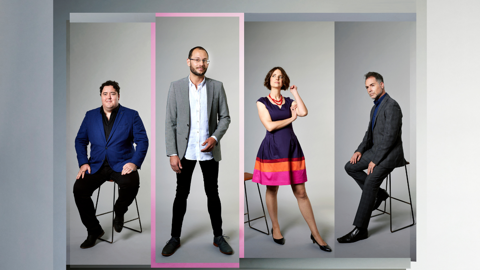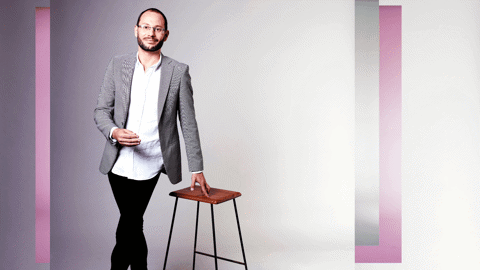ClassikON "Symonds and The Song Company – simply mind blowing"
Is it possible to grow more intelligent by simply attending a concert? Can music stimulate the synapses and promote neuron connectivity? I certainly felt that way on leaving The Neilson last night. The Song Company’s Songs of Rosa Mystica was mind blowing – in all the best ways.
Guest director Jack Symonds (Australian Chamber Opera) was responsible for this evening’s clever program of carefully curated, thought-provoking contemporary masterworks for unaccompanied voices that pushed the limits of convention.
The Song Company’s current evolution has included the revisiting of past commissions and Symonds chose Elliot Gyger’s Ficta to begin the concert. Written as composer-in-residence nearly thirty years ago and performed only once, this work gained a reputation among the singers for being incredibly challenging to the point that they invented the ‘Ficta scale’ against which all future compositions for the ensemble were judged from zero to Ficta! Symonds says it is, “quite simply, one of the most virtuosic things I’ve ever encountered for six unaccompanied voices…” and also, “It looks like the plans for a nuclear weapon or something on the page!”
Why? Well, it’s complicated, ready for this?…the work sets a 15th century text on the ‘rules’ for writing musica ficta alongside the text from the ‘Prize Song’ from Richard Wagner’s Meistersinger (a five hour treatise on how to write a song) and a poem by the hoax surrealist poet Ern Malley about the 15th century artist Dürer. It explores the concept (or construct, if you prefer) of “falseness”, which is undoubtedly a hot topic right now. I’ve summarised Gyger ruthlessly of course, but you can read more here >>.
The music demands a lot from the performers, not only to understand and articulate to an audience the highly intellectual concepts it encompasses, but it also assigns each member of The Song Company to act as a soloist, as well as functioning as part of an ensemble, snapping in and out of the two seamlessly. If that is not enough, each singer must also assume their own predetermined solo style to be performed in character with all the clichés and mannerisms of the characterised period.
It was perfect actually – imagine each soloist vying for supremacy; from Susannah Lawergren’s 19th century bel canto with slightly neurotic vocal flourishes, Jessica O’Donoghue’s funky scatting 1950s’-60’s jazz singer and Andrew O’Connor’s vaguely inappropriate but wholly enchanting 1930’s crooner… add Amy Moore (mediaeval folk exoticism), Timothy Reynolds (Monteverdi Madrigalist) and Simon Lobelson (French baroque elegance) and there you have it.
Each singer rose to the part and added their own personality to the eclectic, time-bending nature of a work that truly pays homage to The Song Company’s virtuosic versatility. Bravo indeed, and thanks to Jack Symonds for pulling this one out of The Song Company’s bottom drawer, and conducting it with such exacting precision, I hope it sees more outings in the future.
The middle section of the concert hung together beautifully around the visionary poetry of Gerard Manley Hopkins, now considered to be one of the greatest poets of the Victorian era but in his own time perhaps a little too radical. These included three movements from Benjamin Britten’s A.M.D.G. Ad majorem Dei Gloriam song cycle and Michael Tippet’s The Windhover. All formidable and stunning works performed with great accuracy and confidence, they sat around the feature work of the concert, Jack Symonds’ world premiere Fire-Featuring Heaven.
Just as Britten and Tippet pushed the boundaries of musicality in their time so does Symonds’ setting of Hopkins’ poem, Spelt from Sybil’s Leaves. The addition of live captured electronics that augmented the a cappella vocals, stretching vowels and reverberating percussive consonants in real time, was ingenious and sound designer Ben Carey was an equally important performer in this work.
Let’s face it, any poem that uses words like ‘dragonish’ and phrases such as ‘as-tray or aswarm, all throughther, in throngs;’ has me a bit smitten already. The words seem written to be sung, and not surprisingly on further research I found that Hopkins himself is quoted as saying the text should be performed, “not reading with the eye but loud, leisurely, poetical…This sonnet shd. be almost sung: it is most carefully timed in tempo rubato.” This is exactly what Symonds achieves, as he invites us to ‘open the poetry out and go deep inside it’. I was glad for the text in the program, the sheer lyricism is still haunting me.
To round off the concert and draw a neat connection to the electronic soundworld of his premiere, Symonds programmed one of his favourite composers, the sadly late, Kaija Saariaho. Quoting his blog on the Song Company’s website best explains his choice, “Saariaho [in Tag Des Jahrs] weaves a hallucinatory spell from her complex, resonant chords (aided here by subtle electronic transformations), colouring the vivid poetry of Friedrich Hölderlin in a way no previous composer imagined. Far from the usual German Romantic tradition encountered with this writer, Saariaho finds a very French sensuality in his gnomic words”. A fitting finish to a profound and memorable concert.
Yes, for me this concert did push the boundaries of musical exploration, demanding my utmost attention and engagement, and yes, it was an utterly enriching experience I wholeheartedly embraced. Thank you to The Song Company for expanding my world (and adding a few brain cells in the process). (Pepe Newton)
Read full review here
_________________________________
★★★★ "The Song Company provides mystical and musical challenges aplenty and a moving farewell to Kaija Saariaho." - Limelight
Guest director Jack Symonds flagged that much of The Song Company’s Songs of Rosa Mystica concert was “demanding” of both singers and listeners, and he was right.
But in among the challenges – and some were significant for this listener, at least – there were also many rewards with much wonderful singing, Gerard Manley Hopkins’s word-bending poetry and a beautiful and moving tribute to Finnish spectralist composer Kaija Saariaho, whose death was announced just a few days ago.
Symonds built his programme around an astonishing a cappella sextet written by Elliott Gyger in 1993 for The Song Company’s 10th birthday. Performed only once before, Ficta uses a 15th century treatise in Latin on musica ficta, or fake music, in which singers introduce sharps and flats, or accidentals, to iron out dissonance, consonance and counterpoint problems.
Gyger’s text also incorporates the lyric from Wagner’s Prize Song from Die Meistersinger as well as a fake surrealist poem from the celebrated Ern Malley literary hoax.
As if this diverse historic layering wasn’t enough to cope with, the six singers are each given a character they have to assume. Soprano 1 (Susannah Lawergren) was a somewhat skittish bel canto diva; Soprano 2 (Amy Moore) a Medieval folk songstress; Alto (Jessica O’Donoghue) scatted smoothly as a 1950s jazz singer; Tenor (Timothy Reynolds) a Monteverdian madrigalist; Baritone (Simon Lobelson) a French Baroque high, and Bass (Andrew O’Connor) a Hollywood-style 1940s crooner.
Over its 20-minute duration the performers have to slip in and out of character, negotiate extraordinary harmonies, timings and vocal somersaults in what Symonds describes as “quite simply one of the most virtuosic compositions I’ve ever encountered for six unaccompanied voices”.
Each singer has a tuning fork, sometimes two, to hold to their ears so they can get their entry note right, and from the audience’s point of view this was a remarkable display of perfect musical and theatrical precision and co-ordination, all superbly micro-managed by Symonds.
The next part of the concert was built around musical settings of the poetry of English late Victorian Jesuit innovator Manly Hopkins. British composers and friends Benjamin Britten and Michael Tippett both wrote settings, unbeknown to each other, when, as fellow pacifists, they were separated in World War II – Britten in the US and Tippett in London, where he later served a few months in prison as a conscientious objector.
Hopkins’ poems are all about God and nature, and Britten chose the former for his four-voice settings Ad Majorem Dei Gloriam, the motto of the Jesuits, while Tippett chose his best-known verses about a falcon, The Windhover: “High there, how he rung upon the rein of a wimpling wing in his ecstasy!”
The Song Company performed three excerpts from the Britten work – Rosa Mystica was paired with God’s Grandeur, and O Deo, Ego Amo Te later closed the Hopkins set.
Lawergren, O’Donoghue, Reynolds and Lobelson blended seamlessly for Rosa Mystica, the sopranos floating in harmony above the monotone chant of the lower voices, and O’Connor added his mellow bass for the more muscular God’s Grandeur, with Moore taking on soprano duties.
Symonds’ own Hopkins setting, Fire-Featuring Heaven, receiving its world premiere, used the electronic sound world of designer Ben Carey for added effect, complementing the Saariaho’s four seasons piece, Tag des Jahrs, which closed the concert.
Symonds says of his new work: “As I was setting this poem (Spelt from Sybil’s Leaves), I found the words seeming to grind against each other, warping and buckling under the intense pressure of Hopkins’s dark rumination
Carey’s synthesiser captures vocal phrases from the live performers, cuts them up and regurgitates them into speakers around the auditorium. Voices and electronics interweave and segue, bending notes, and as Hopkins’ hellish vision develops the music becomes more strident with disturbing dissonances, all delivered in sense-surround sound. At times it was difficult to distinguish where the voices ended and the synthesiser began.
Saariaho’s gorgeous setting of Friedrich Holderlin’s 18th century poem was a highlight, Carey’s handling of the electronic soundtrack adding a fascinating dimension to a work which captures the feeling of the seasons with such mastery.
It was a splendid conclusion to a thought-provoking 75 minutes of unusual but impeccably sung music. (Steve Moffatt)


